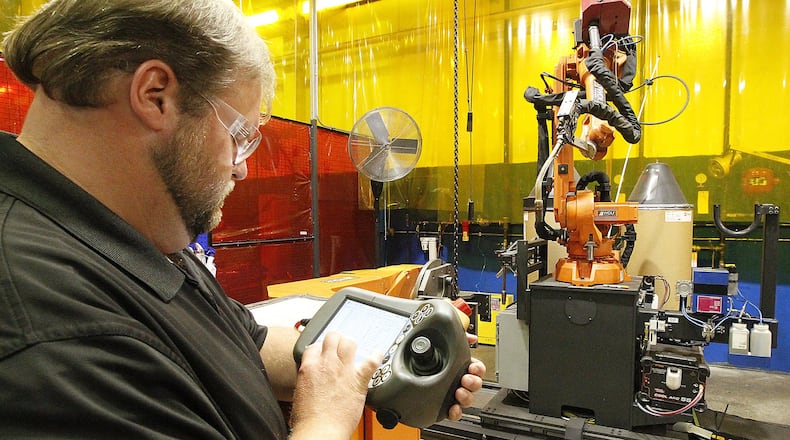Local businesses working with Clark State said the degree will provide more options to train the local workforce and allow some employees to take on new responsibilities.
READ MORE: Housing, worker retention a challenge in Clark County, leaders say
It’s also appealing because the program being developed will require more hands-on training than most four-year programs, said Darlene Carpenter, a human resources manager at Cascade.
“Most of our employees here have said they took this kind of work because they like to learn hands-on,” Carpenter said. “To go to a traditional college is not really appealing to them at all. But to continue their coursework with the hands-on methods that Clark State provides through their self-directed learning labs, we would be able to progress their education and promote them from within.”
Clark State has increasingly focused on providing training for the region’s manufacturing workforce in the past several years. The college developed new manufacturing labs and classrooms in 2015 with funding from a $2.5 million U.S. Department of Labor grant.
The college trained fewer than 20 students a year in manufacturing as recently as 2013, but now trains more than 300 students annually since implementing programs through the grant.
DETAILS: Attracting retail, new business remains a challenge in Clark County
More than ever, manufacturing firms require skilled labor to remain competitive, said Amit Singh, provost and senior vice president at Clark State. The four-year program will provide more opportunities for workers to earn skills needed for management and supervisory careers, which has been an area of need, he said.
“Our employers are looking for more skilled people,” Singh said. “At the same time there are more retirements happening and there’s a vacuum now, especially for mid-level jobs that require a little more skill.”
MORE: Springfield hospital gets national certification for stroke care
The provision included in Ohio’s budget makes it the 24th state to allow community colleges to offer four-year degrees. Before Clark State’s program can move forward, it must be approved by the chancellor of Ohio Department of Higher Education and the Higher Learning Commission. Singh said the goal is to offer the program for the fall semester in 2018.
It will be the first four-year degree offered by Clark State. Sinclair Community College also plans to offer four-year programs in unmanned aerial systems, aviation and industrial automation.
RELATED: Clark State extends tuition discount for military families
To receive approval, community colleges must demonstrate a need in the local workforce and show that the program isn’t already offered at a similar school. Along with Cascade, Clark State is also working with local manufacturers like Honda and McGregor Metalworking to develop the curriculum.
Allowing community colleges to offer four-year degrees might make sense as long as there’s strict oversight, which appears to be the case under the state’s current chancellor, said C. Todd Jones, president of the Association of Independent Colleges and Universities of Ohio, which includes members like the University of Dayton and Wittenberg University.
MORE BUSINESS NEWS: Champaign wind farm may move forward after nearly decade-long fight
But he cautioned there’s a risk long-term of creating programs that already exist at four-year colleges and universities, which he said could lead to a waste of taxpayer dollars. He cited Florida as an example, where Jones argued some colleges are graduating teachers and nurses who often fail to pass required qualifying exams to enter the profession.
In some cases, institutions aren’t accredited, which could prevent those graduates from entering the field. The state legislature in Florida created a moratorium on new programs this year because of massive program duplication, he said.
“It’s not ever something that should be done with light regard,” Jones said. “You’re talking about taxpayer dollars, you’re talking about a significant risk of program duplication and that has to be weighed going forward. It also changes the very nature of community colleges to move into these Bachelor’s degree programs, and there’s obviously a significant risk going forward based on the experience in other states.”
Jones said he’s hopeful the process in place in Ohio will prevent similar problems.
Singh said the decision whether to create additional programs will depend on whether local employers see a specific need that’s going unmet in the region.
“We don’t want to compete with other schools that already offer a program,” Singh said. “We’re trying to meet unmet needs. As a need emerges, we’ll work on those.”
By the numbers:
20 — Estimated students enrolled in manufacturing at Clark State in 2013
300 — Estimated students in manufacturing programs now
2018 — Year new program is expected to begin
Complete coverage
The Springfield News-Sun provides unmatched coverage of higher education and manufacturing in Clark and Champaign counties. For this story, the paper spoke to local businesses, officials at Clark State Community College and others about a new bachelor’s degree program in manufacturing.
About the Author
